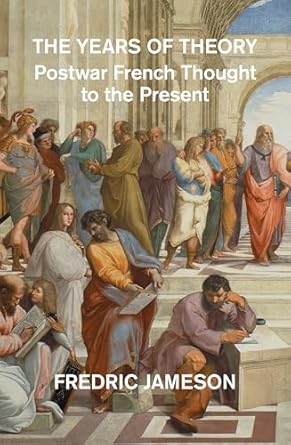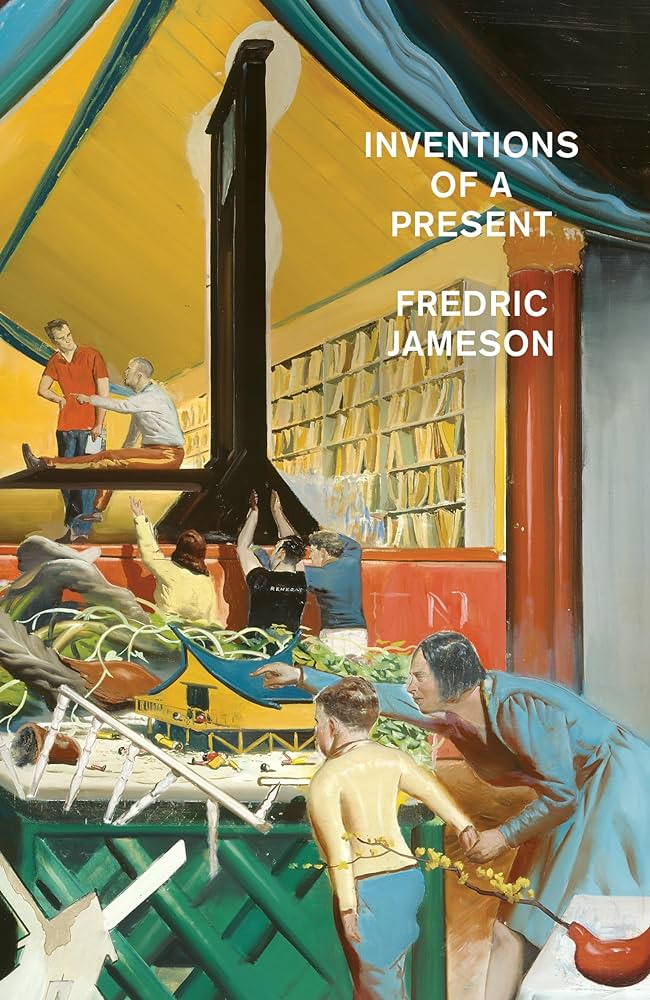
- Free Article: No
- Contents Category: Literary Studies
- Review Article: Yes
- Article Title: Highways and byways
- Article Subtitle: Fredric Jameson in a more informal vein
- Online Only: No
- Custom Highlight Text:
Fredric Jameson, who died in September 2024 at the age of ninety, was one of the great literary and cultural critics of our time. He spent most of his academic career at Duke University in North Carolina and published two books around the time of his death: Inventions of a Present just before, The Years of Theory just after. The first is a collection of essays on the novel originally written between 1972 and 2022, mostly for the London Review of Books and the New Left Review. The second is a transcript of a seminar series on French cultural thought between 1945 and the 1990s that Jameson taught at Duke in the first semester of 2021, at the age of eighty-six. These classes were recorded for posterity because they took place during the Covid era and were captured on the video technology he was using for teaching.
- Featured Image (400px * 250px):

- Alt Tag (Featured Image): Paul Giles reviews ‘The Years of Theory: Postwar French thought to the present’ and ‘Inventions of a Present: The novel in its crisis of globalization’ by Fredric Jameson
- Book 1 Title: The Years of Theory
- Book 1 Subtitle: Postwar French thought to the present
- Book 1 Biblio: Verso, $68.99 pb, 458 pp
- Book 1 Cover Small (400 x 600):

- Book 1 Cover (800 x 1200):

- Book 1 Readings Link: https://www.readings.com.au/product/9781804295892/the-years-of-theory--fredric-jameson--2024--9781804295892#rac:jokjjzr6ly9m
- Book 2 Title: Inventions of a Present
- Book 2 Subtitle: The novel in its crisis of globalization
- Book 2 Biblio: Verso, $42.99 hb, 264pp
- Book 2 Cover Small (400 x 600):

- Book 2 Cover (800 x 1200):

- Book 2 Readings Link: https://www.readings.com.au/product/9781804292402/inventions-of-a-present--fredric-jameson--2024--9781804292402#rac:jokjjzr6ly9m
These books are very welcome additions to the Jameson critical canon, not least because both are mediated through an idiom of informality that makes his work easier to assimilate for the non-specialist. Jameson’s early style of criticism tended to be dense and synthesising, influenced by austere linguistic theory and Marxist architectonics. Both books from 2024 are, for different reasons, driven by a more casual narrative voice, with the editor of Years of Theory, Carson Welch, admitting the preservation here of Jameson’s ‘colloquial’ and ‘extemporaneous speech’ from his lectures ‘may come as a relief even to admirers of his written works’. Jameson the pedagogue takes care to explain differences between terms such as the transcendent and the transcendental, and he throws a few bones of empathy to his audience, beginning his final class, in a brief nod to student feedback, by saying he ‘much appreciated your comments’, even though ‘it is a little too late to use them’.
At the end of Years of Theory, Jameson says that he has been teaching ‘a history course’, and one thing that emerges most clearly from these lectures is a sense of historical relativism. He tracks back through the key figures of postwar French culture – Sartre, Foucault, Althusser, Lacan, Kristeva, and others – but he is always concerned to read their work in relation to the specific historical matrix that informs it. He is more interested in the conceptual framework within which any given writer is working, and in its aesthetic formations, than in the work’s philosophical validity. Of Gilles Deleuze, for instance, Jameson asserts: ‘He is a great writer … I don’t care how true or false it is.’ This fits with Jameson’s explicit rejection of truth-telling as a concept and his insistence that it is the use of a term, not its lexical definition, which is significant. He argues that we need to understand ‘the truths’ of ‘other systems – these other moments of time, of history’, and not simply to discard earlier thinkers for what we might now think of as their incorrect assumptions. ‘It is irrelevant what mistakes Hobbes or Hume or Plato made,’ he says. Rather than quasi-religious notions of truth, Jameson prefers Sartre’s term ‘facticity’, saying there are ‘facts that I can’t get around. I can’t change the fact that I was born in that year. I can’t change the fact that I was born in this country.’ But any given hypothesis also involves a choice to include some facts and exclude others, which is why Jameson, for all his interest in social affairs, avoids political preconceptions in his treatment of particular authors, assessing as he does their textual range rather than their factional affiliations.
All of this contributes in the Duke classes to a tone of agreeable informality, rather than didacticism. He revels in gossipy observations about how ‘Foucault and Derrida hated each other’, how nobody ‘had so many enemies as Derrida’, and so on. Jameson was an active participant in the intellectual circles he describes; this gives his lectures the kind of liveliness that comes from this work’s semi-autobiographical provenance. Sartre, on whom Jameson wrote his dissertation at Yale and who was the subject of his first book, is the foundational figure here, but Jameson’s awareness of the highways and byways of French culture enables him to make unusual connections that would not have been available to a critic less engaged with this cultural scene. Many of his most illuminating comments are thrown in casually, as when he remarks in passing how the anthropologist Claude Lévi-Strauss was ‘a great Wagnerian’ while linking Lévi-Strauss’s writings on geology to Wagner’s translation of time into space in Parsifal.
It must have been a treat for the students at Duke to participate in this class. Nevertheless, there are a few indications that Jameson’s approach was beginning to look a little dated in his final years. He is generally not so interested in women writers, though he does address Simone de Beauvoir and Julia Kristeva in this course; and he admits to finding the concept of the Anthropocene ‘a little puzzling’, even though, diligent pedagogue that he was, he directs students ‘who are interested in this idea’ to relevant primary sources. But Jameson’s own view, that ‘nothing is natural in nature’, is predicated on ways in which all political systems are based around discursive constructions rather than primal realities. ‘All language is an alienation,’ he says, remarking that, although James Joyce acknowledged that he spoke ‘the language of the conquerors’, this did not mean that he wanted to turn ‘back to produce a Gaelic literature’. Such a rigorous rejection of authenticity as a category has interesting implications for critical work in Australia today, not least in the context of Indigenous writing, where the status of linguistic constructivism continues to be a vexed question.
Jameson’s shorter book, Inventions of a Present, focuses more on literary analysis than cultural theory, featuring as it does a collection of essays on particular writers produced in his journalistic idiom. Again, many of the brilliant insights emerge through casual aperçus, such as the observation that Samuel Beckett’s plays come out of a period, concomitant with ‘the breakdown of the modern’, which ‘was certainly also a glorious moment in the theatre, across the world’. Jameson’s journalism has an aphoristic quality that made it attractive to readers of the London Review of Books, even if his contention, in a discussion of William Gibson, that ‘eBay is certainly the right word for our current collective unconscious’ might be stretching a point. This is the sort of quip Oscar Wilde might have made at a dinner party had he been alive in 2003, but it takes a passing reference in Gibson’s novel Pattern Recognition and builds it up into a claim that seems too hyperbolic.
More systematically, though, Jameson in this book mounts a consistent argument for the enduring value of great literature. He is not shy about using such terms of critical discrimination, calling American novelist Robert Stone ‘a very great artist indeed’ and Don DeLillo ‘the most interesting and talented of American postmodernist novelists’. Part of this respect for ‘the function of genuine art’ comes from Jameson’s own reverence as a young scholar in the middle years of the twentieth century for the work of Henry James, Ezra Pound, and William Faulkner, whom he recognises as the ‘three American writers who meant something to me in my intellectual formation’. But part of it comes from the Marxist notion promoted by György Lukács, cited on the first page of this book, that it is great writers who reveal social conditions most fully and precisely through the multidimensional qualities of their work. Though he did not share Lukács’s hostility towards modernism, Jameson follows the Hungarian critic’s theoretical model through his positive evaluation of the fiction of Norman Mailer and corresponding castigation of the ‘cheapness’ and ‘meretriciousness’ of James Dickey’s ‘imagination’. Mailer today is deeply unfashionable because of his overt misogyny, but Jameson’s point is that Mailer’s treatment of violence and ego-centricity can illuminate how embedded structures of competition in American life are operating: ‘His social and historical value for us, and his greatness and integrity as an artist, can thus be measured by the degree to which he has actualized everything which in and around us is only potential.’ Although this essay was originally published in 1972, the importance for Jameson of aesthetic criteria runs through to this book’s final essay from 2022 on Polish writer Olga Tokarczuk.
The ‘great writer’, in Jameson’s eyes, is thus the one who can ‘thematize their ideological raw material’, allowing us ‘to walk all around these otherwise latent and implicit unconscious attitudes which govern our actions’. In this reading, the writer’s own attitude to such ‘ideological material’ is of little or no importance. This is the very antithesis of contemporary cancel culture, since it explicitly argues that ‘it does not matter whether Balzac was a reactionary, or whether Mailer is a sexist, a dupe of the myths of American business, and so forth’, with ‘his essential task as a writer’ being ‘to bring such materials to artistic thematization and thus to make them an object of aesthetic consciousness’. Jameson is particularly convincing in his analysis of the ‘fundamental uncertainties and hesitations’ in Joseph Conrad’s fiction, discussing ways in which Conrad’s complex negotiation of Polish, French, and English cultural pressures led him to a suspicion of all local jurisdictions. ‘To call all this “Toryism”,’ argued Jameson in a late essay from 2020, ‘is a gross oversimplication of a complicated existential situation, which obscures the political as well as the historical meaning of Conrad’s texts.’
Despite Jameson’s pre-eminence as a critic, it could be argued that in general terms he is less convincing in his treatment of abstract patterns than in analysis of particular writers and situations. There are shaping influences throughout his work from the structuralist (and Christian) typologies of Northrop Frye, as well as from more obvious Marxist sources such as Mikhail Bakhtin and Lucien Goldmann, all cited here. Inventions of a Present also contains an interesting essay originally published in the New Left Review about the literature of East Germany, whose concern to produce novels of collective society is sympathetically explored in the critical account of Uwe Tellhamp’s ‘massive novel Der Turn (The Tower)’. Jameson draws here on Sartre’s notion of ‘a slumbering and unconscious freedom’ that needs to break through ‘layers of inauthenticity’ to find creative expression, with Hegel’s version of progressive teleology, which helped to shape utopian thought of the 1960s, evident in the conceptual background.
This more polemical side of Jameson might now seem a bit dated, but it was one of the great merits of his critical oeuvre that it encompassed such a wide variety of intellectual and cultural resources. Inventions of a Present includes pieces on the television series The Wire as well as knowledgeable accounts of literary work from Japan and the Soviet Union, with the author drawing on his professional training in Comparative Literature to expand his analytical range in unprecedented ways. In a 1992 review of Jameson’s famous Postmodernism book, Malcolm Bradbury suggested that the author was too immersed in the ‘postmodern labyrinth’ to obtain the kind of proper critical distance on this term appropriate to an interpretation governed by his own avowed priority of ‘Marxist history’. Perhaps this was so, but it was one of Jameson’s strengths as a critic that his work embodied the kind of supersession of an individual author’s consciousness and authority that he attributed to the likes of Norman Mailer. Mailer’s work, like Jameson’s, embodies a vast range of material and critical insights that swamp any move to classify it reductively within a singular framework.
In this sense, Jameson might in future years appear a critic more in the mould of C.S. Lewis rather than Northrop Frye, since Lewis is still appreciated today for his canny and sometimes idiosyncratic readings of medieval texts, even though the superstructure that informed his view of a Christian world order has generally been discarded. Jameson, similarly, is attracted to some of the structuralist typologies of Frye, but the more striking qualities of his work derive, unlike Frye’s, from its unexpected twists and turns. Jameson’s special skill involved finding juxtapositions and resonances between social and aesthetic forms, thereby enabling the kind of critical insights that would not have been available to a less learned reader. Both of these works, in their magisterial scope but also in their genial informality, contribute in valuable ways to the intellectual force of Jameson’s continuing critical legacy.


Comments powered by CComment